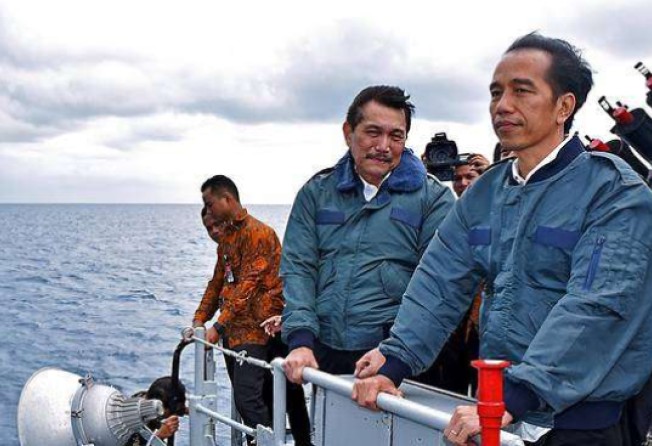
Indonesia has these bigger fish to fry than South China Sea
Joko Widodo’s reshuffle comes amid loud noises on sovereignty, but is aimed more at economic issues than addressing tensions with China over fishing rights

Acabinet reshuffle in Indonesia by President Joko Widodo that puts his former chief security minister and right-hand man Luhut Panjaitan in charge of maritime affairs is more about striking a political balance in the coalition government than adopting a harder line with China over disputed fishing rights in the South China Sea.
Widodo’s July 27 reshuffle, in which 13 of his 34 ministers were either replaced or moved sideways, came weeks after he held a cabinet meeting aboard a warship in waters off the Natuna Islands, following it with orders to expand offshore oil exploration and commercial fishing.
But the changes were mostly focused on improving his economic team as Indonesia struggles to close a widening budget deficit and get back to a five per cent-plus growth rate.
The president’s main motive in transferring Panjaitan to the maritime portfolio was to compensate one-time armed forces commander Wiranto for removing two ministers from his People’s Conscience Party, which has supported Widodo from the day he entered the presidential race in early 2014.
Unlike his predecessor, Susilo Bambang Yudhoyono, Widodo does not regard foreign relations as a high priority unless it helps in foreign investment or trade. A retired army general, Panjaitan has been key to shoring up Widodo’s political support since he came to power 18 months ago, which is why insiders say he was unhappy at his abrupt transfer to a less influential post.

In recent months, he had also taken a leading role in diplomatic efforts to deal with the intrusion of Chinese fishing boats into Indonesia’s Economic Exclusion Zone, including one incident where a Chinese patrol boat entered Indonesian waters to seize back a captured fishing boat.
When Widodo held his shipboard cabinet session in late June, Panjaitan said it was a clear message Indonesia was “very serious in its efforts to protect its sovereignty”.
Widodo told the Brookings Institute last October: “We reject any attempt by any state to control and dominate the sea and turn it into an arena for strategy competition … we need to talk closely to ensure good order at sea, prevent incidents, and ensure freedom of navigation.”
Beijing recognises Indonesian sovereignty over the Natunas, but in a new shift it now claims the 200-nautical-mile Exclusive Economic Zone is part of “traditional Chinese fishing grounds”, a concept not recognised under the 1982 UN Convention on the Law of the Sea, to which it is a signatory.
While Indonesia is not a claimant to the Spratly Islands, which China argues ownership of against other regional powers, it has become alarmed at the number of incidents involving Chinese trawlers and Chinese coastguard corvettes which, until the Indonesian navy’s recent intervention, were able to intimidate lightly armed maritime patrol vessels.
Those problems came to the fore when Panjaitan led a delegation to Beijing for last April’s Fifth Bilateral Dialogue, a visit which clearly pleased Chinese officials who have worked to create divisions within the Association of Southeast Asian Nations (Asean), four of whose members are Spratly claimants.
Widodo has been reluctant to enter into a full-blown row with China because of its funding for vital infrastructure projects, pinning his hopes on Jakarta’s efforts to persuade China to sign off on a tension-lowering code of conduct for the South China Sea. Panjaitan, for his part, has been careful not to say anything inflammatory, telling This Week in Asia on his return from Beijing he was hopeful of an amicable solution. A month later, senior Chinese coastguard officers arrived to begin talks on a memorandum of understanding with their Indonesian counterparts.
The maritime coordinating ministry’s point man on sovereignty issues – an important component of Widodo’s much-trumpeted maritime policy – is veteran diplomat Havas Oegroseno, once a front runner for Foreign Minister Retno Marsudi’s position.

Asked at an August 2 forum about the rash of incidents in northern Indonesian waters, Oegroseno followed what has become the official party line. “It is not a dispute,” he insisted. “We’re just protecting our interests.”
Also under Panjaitan’s wing is popular fisheries minister Susi Pudjiastuti, who has put a serious dent in rampant poaching across the archipelago.
Although she accompanied Panjaitan to Beijing and gets along well with him, Pudjiastuti’s no-nonsense approach leaves little room for diplomatic niceties when it comes to saying what she thinks and scuttling trawlers caught fishing illegally in Indonesian waters. Last week she made waves again when she said only Indonesians were allowed to fish in Indonesian waters.
Panjaitan will have other fish to fry as well. His new portfolio has oversight of the mines and energy ministry, currently grappling with issues ranging from the development of eastern Indonesia’s Masela gas field to a contract extension for US mining giant Freeport McMoRan Copper & Gold in Papua.
With Panjaitan otherwise distracted and Wiranto more inclined to look inward than outward in his new role as political coordinating minister, the South China Sea will remain very much the domain of the foreign ministry.